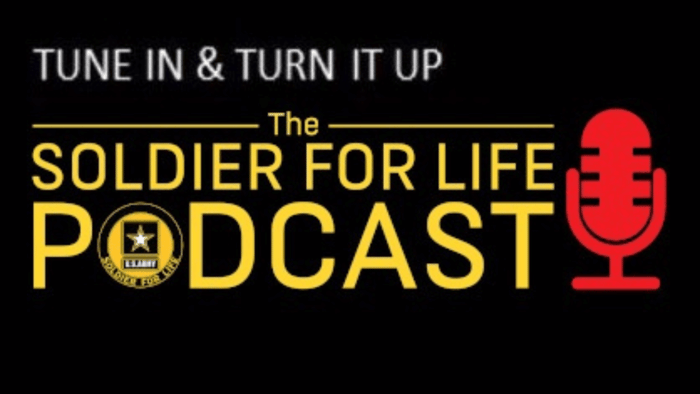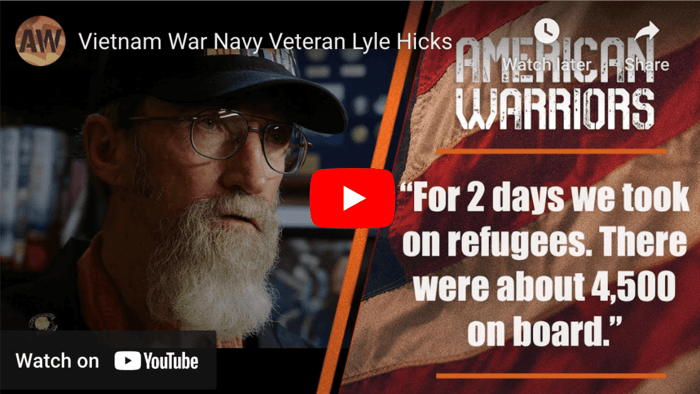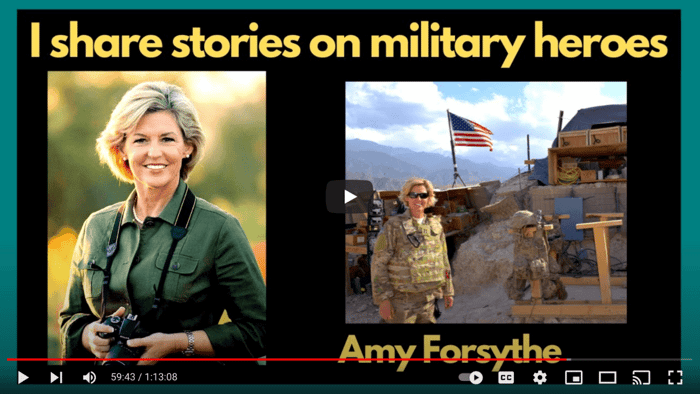Military Family Financial Readiness - SFL Live #21 - 6 April 2023
Sun, 04/09 21:26PM · 35mins
Resources:
SFL LinkedIn: https://www.linkedin.com/company/usarmysfl/
Sarah Bumgardner, CFEI®: https://www.linkedin.com/in/sarah-bumgardner-cfei%C2%AE-1114aa94/
SFL Parade Deck: https://paradedeck.com/creator/SFLLIVE
Thank for joining us today on #SFLive for our discussion about military family and military spouse financial readiness with Sarah Bumgardner, CFEI®, the Director of Partnerships and Member Engagement for the American Armed Forces Mutual Aid Association (AAFMAA). You host is Lieutenant Colonel Ismael Ortizrivera employment director of Soldier for Life, and Military & Military Spouse Influencer.
U.S. Army Soldier For Life is an official U.S. Army program created to help connect current Soldiers, retired Soldiers, veterans, and their families with education, employment, health and wellness, and U.S. Army retirement resources and information via our powerful network of government and community organizations, corporations, advisors, educators, and retired and veteran Soldiers. The following does not constitute an endorsement by the United States Army or the Department of Defense.
Kindly find the attached transcript and notes. (Please pardon any typos, as we employed advanced AI to transcribe our video).
00:06
Once a Soldier. Always a Soldier. A Soldier For Life! The appearance of external links or the use of third-party applications on this site does not constitute official endorsement on behalf of the U.S. Soldier For Life program, U.S. Army, or Department of Defense. Any information or resources that are posted or shared here are informational and not an endorsement or partnership of Soldier For Life, the U.S. Army, or Department of Defense.
01:19
We have also Stephen Harvey from Lisbon, Virginia. Welcome. And we have Master Sergeant Sau Angulo from Illinois. Welcome to our program. Also, if you want to listen to this episode or revisit previous ones, you can subscribe to the WWW.YOUTUBE.COM at us armysfl you can listen soldiers for live podcast you can visit our website.
02:08
And with that and we have a guest speaker that we're going to talk about financial readiness for military spouses. You may ask why military spouses know the whole family. Well, according to the Military Family Advisory Network published in January 2023, in active duty families, the military spouse was more likely to over c financial management.
02:32
That's why let me do something here, okay? That's why we invited Ms.Sarah Bongard, director of partnership and member engagement for American Armed Forces Mutual Aid Association, is called AAFMAA, and she's a certified financial educator instructor.
02:56
Welcome to our program, Sarah. Hi, thank you so much for having me here today. I'm really excited to talk about money. And that's very important to our families financial readiness. It's an honor to have you here.
03:12
Have you here during the past program, we address different topics that concern the military community, but also it's relevant to the military spouse, the financial readiness. But before we continue, I want the audience know a little bit about yourself.
03:29
Yeah. So I was a military spouse for eleven years. I was a Marine Corps spouse, so please don't hold that against me. But through our transition from active duty to the civilian world, all of the sudden saw all of the things I never noticed before.
03:48
And a lot of it was from a financial standpoint, things you just don't think about when you're on active duty, how money is being paid to you, what you pay for life insurance or health care or things you aren't even paying.
04:02
And. You know, I was too busy, right? I was too busy raising kids by myself or learning to fix a toilet in the middle of the night by yourself because you're the only one there or working. And all of the things that military spouses have to do day in and day out, and you just don't notice the other things because you just have so much bandwidth, but only so much you can do.
Thank for joining us today on #SFLive for our discussion about military family and military spouse financial readiness with Sarah Bumgardner, the Director of Partnerships and Member Engagement for the American Armed Forces Mutual Aid Association (AAFMAA).
04:24
Yes. And I always say in our programs, the military spouse, they are the one who hold the fort together, held the fort together when we are on deployment. So where to the why? We're doing other activities I would like to highlight asara is the director of partnership and Member engagement of AAFMAA is an organization that celebrates 140 years of foundation.
04:47
Can you give us, in a nutshell, the history of AAFMAA and why and what services they provide to the military community? Yeah, absolutely. So AAFMAA was established 144 years ago. We are the longest standing nonprofit of our kind, and we take a lot of pride in that.
05:04
We were started out of need up until this point, 144 years ago, if a service member passed away, they would quite literally pass the hat to try and give funds to the family. And there was a Battle of Little Bighorn and there were no survivors.
05:21
And through that, asthma was started because we realized we have to do something to protect our military spouses and the children of service members. And so we do that now to this day, 144 years later, through life insurance.
05:36
We have life insurance products for every phase of a service member's life through a military spouse's life and as well as children. So we also have wealth management and trust division and a mortgage services division.
05:52
But that's a little bit about asthma and our real passion in financial education and protection for families. Thank you. And all these services are available to all branches from the military? Absolutely.
06:06
All branches. Active duty reserve. Retired National Guard. Also National Guard. Absolutely. Okay, excellent. I mentioned at the beginning of the program the results about the 21 DoD survey, another program, I should say, the importance of the financial security for the military spouses.
06:27
But the main questions that we have is why it is important to be financially ready. Yeah, that's a great question. And so the simple answer is because at some point you will leave the service, right?
06:40
It'll either be through retirement or separation or an unforeseen death or even a divorce. And you have to kind of be ready and thinking about that and have a handle on your finances for the unexpected.
06:55
So for me personally, after transitioning from active duty to civilian world, I then got divorced and all of a sudden it was kind of like this process went over again, right? And instead of how are we going to do this?
07:09
It was how am I going to do this? And I realized I should have probably been a little bit more financially aware earlier in my life. All it would have done was set my family up for success more but also set myself up for success more as a military spouse should there have been a death or a divorce.
07:29
And it really gave me the push to realize that military spouses need to be educated on financial readiness. Just like the MFAN results. They're the ones handling the majority of the finances but no one's kind of talking about it and saying let's learn things that we can do to protect not only ourselves but our family as a whole.
07:48
Yes. And sometimes when I'm listening to you, sometimes also we think that events like family losses, family separations, we feel like this is distant from us, but. It's like we think that we're not going to go through this, but the reality is we go through those process.
08:06
Unfortunately, we have losses or separations. Now, what do military spouses need to know to be financially ready? Sarah sure. So we're going to talk about a couple of things today, but one of them is a spousal IRA.
08:22
And so I want to talk about that because it's really important. For starters, military spouses are unemployed at 22%. That's the highest unemployment demographic in the US. And between 31% and possibly 51% are underemployed, which is saying that there is obviously not a second stream of income or there is not enough of a second stream of income coming into a family.
08:50
And so if you are a military spouse and you're not working outside of the home, you can still open a spousal IRA, you can still save for your retirement, for your family's retirement on your own. You have the same rules as everybody else in an IRA.
09:06
You can open that IRA as a Roth or a traditional account if you can. I think Roths are awesome. Learn a little bit more about those. But you can save up to $6,000 a year in savings, and all you're doing here is saving for not only your future, but your family's future as a whole.
09:25
And it's just an additional way, right? And if you are a military spouse and you are working outside of the home and you're contributing to a company 401, which I hope everyone who has the opportunity is, you two can still open an IRA and you can still now have an additional stream of savings.
Thank for joining us today on #SFLive for our discussion about military family and military spouse financial readiness with Sarah Bumgardner, the Director of Partnerships and Member Engagement for the American Armed Forces Mutual Aid Association (AAFMAA).
09:45
So you can put up to $22,500 into a 401. You're an employer and you can put up to $6,000 into an IRA. And those numbers are quite high, right? That's a lot of money, but. Doing just a little bit, just doing something to put towards that will make such a big difference in the long run.
10:06
Yes. It's like a building block. We start creating the foundation and we keep building, building. I remember when I was younger, I was seeing my retirement so far away that they didn't take advantage of those.
10:19
And when I see the reality of the IRA or the systems that we have to be financially ready for retirement or any situation that we need is incredible. And it's something that we encourage all the community, military community to take advantage of.
10:34
Well, I'm lieutenant colonel is my alert tibeta employment director of solder for life and I'm having a phenomenal conversation with sarah bongarner, director of partnership and member engagement of the american armed forces mutual aid association.
10:47
If you have questions, please write them in the chat and we will answer them live. Unfortunately, we have to pause now. Briefly, when we return, we will discuss budgeting rules, how to do a debt free transition, and the strategy to have a good credit score.
11:06
Keep connected because we're going to be right back. The following video does not constitute an endorsement by the United States Army or the Department of Defense. If you are a military spouse looking for new job opportunities or initiating your professional career, in that case, the upcoming Virtual Military Spouse Hiring Event is for you.
11:27
Take advantage of this opportunity. During the last event, for every job seeker that attended, many interviews and offers were extended. You will engage dozens of military friendly organizations with nationwide oconus and remote options that understand your worth and are looking to hire you.
11:45
Although the hiring event is hosted by the US. Army Soldier for Life organization, it is open to all military services. Mark your calendar for Thursday, May 11, 2023, from 11:00 A.m to 03:00 P.m Eastern Standard Time.
12:00
Hosted by Soldier for Life and powered by Recruit Military, which is the contracted employment service provider. Partner to the United States Army. We are back. I'm here with Sarah Bomb Garner. And Sarah, I was talking in before that when we were young, we see retirement as I saw something distant.
12:24
However, I am about to retire. Time passed quickly, and what seemed to be distant now is close to me, it's close to everybody else. And you were talking about investment. And investment, like IRA, always allows you to save money for retirement in a tax advantage way.
12:43
An IRA also helps an individual to save for retirement with a tax free growth on a tax deferred basis. Depends on the type of IRA they choose. However, before you decide to open an IRA or do any financial step, you must take into consideration your budget.
13:03
And this is the meat and potatoes of our program. Yes. Sarah, let's talk about budget, why budget is important and what are the recommendations you have for budget? And I have a slide here, let me okay.
13:18
Yeah. Well, you can't save money without a budget, right? It just won't work. It doesn't make sense, and it won't work. And this is where we see a lot of people get into trouble, is because they don't have a budget, so they.
13:33
Aren't saving. So let's take kind of a look at this slide. There's a really easy tool that we use and we talk about, which is called a 50 30 20 split. The budgeting rule. And what it says is, it says that 50% are for your needs, right?
13:49
The things like your home, electricity, food, water, right? Shelter our needs, the things we really need. 30% are for our wants. Those are the vacations and the fun things that we want to be able to do.
14:05
And then 20% is allocated to savings, right? But hold on, we're going to break that 20% down just a little bit more. We're going to say 10% of that needs to go directly to a retirement account, right?
14:18
So that could be your spousal IRA if you're not working outside of the home. It could be a 401K if you are employed, or it could be between a an IRA. But 10% needs to go to a retirement account, and then 10% needs to go to an emergency fund because we find that the military doesn't do a great job of having emergency funds.
14:43
And so it doesn't matter if you have $1,000 or you have $100,000 to allocate you can allocate your funds into a 50 30 20 split so that you can start saving. Yes. So you mentioned emergency funds. Let's talk a little bit more.
15:00
What is emergency funds for, and what is the kind of the rule of thumb for that? Rule of thumb is that you should have at least three months, a minimum three months of living expenses. And when we say living expense, it's true.
15:14
Living expenses. What it costs to operate your life day to day and your family's life day to day for three months. That's a good safety net for an emergency fund. So we have to take. That part of the 20% just to build that emergency funds exactly.
15:33
In case of something happened. Okay, but I want to dig a little bit more into the budgeting. I want to move towards debts because I saw in the slide it was the 20% is about debt and some of the financial issues is over, indebtedness of bankruptcy that can lead to loss of security clearance, admins actions or even involuntary discharge from the military.
15:57
Our debts are necessary and let's talk about the good and bad debts. They are, they're necessary, but like you said, they can have huge consequences if you're in the active duty space, if you're in the military.
16:11
So let's talk about good debts and bad debts. And I think, yeah, we've got a great slide here. Debt is necessary. Debt can actually be good. It can build your credit worthiness, allow you to purchase a home or a car.
16:24
But we see way too many service members get into the bad debt column. If you think about it right, the closer you get to military installation, there are two things that we start seeing a lot of. We start seeing a lot of used car dealerships and we start seeing a lot of quick clash places like payday loans.
16:42
And those are our bad debts. So a good way to think about debt is if you have something to show for it. It's usually a good debt. If you have a mortgage, you have a home to show for it. If you have student loans, you have an education to show for it.
16:56
Bad debts. If you have a pawn shop loan, you just have cash, but you don't really have anything to show for it. And so that's where we want to stay away from is that bad debt. I will say, and I will caveat on that the good debts, I'll call them alpha investment because when you have a mortgage, you are saving because what's going to be earning money is like it's a passive earning, right?
17:22
Yes, absolutely. And then when you do a student loan, people say, okay, I'm getting in debt. But you are investing in yourself. Those are good debt because it makes you grow. It make you expand the horizons and your ability to bring and improve your financial readiness in your family.
17:41
Now, let's talk about the time when it's time to transition. We found out that 79% of the soldiers in the army this is the statistic from fiscal year 2022 in Soldier for Life. 79% of the soldiers in the army transition with ten or fewer years of service.
18:05
Most of them, maybe they have jobs, they don't have jobs, maybe they have debts. What are they going to face when the soldier transition without a pension? Yeah, they're going to face a lot. And we have this right here which shows US.
18:19
Military Family Advisory Network reports 49.2% of those service members that are transitioning, which is the majority that are transitioning without a pension do not have $500 in savings or zero savings.
18:34
And so what happens when an unexpected expense occurs is that you then can't get yourself out of it. Right? You don't have an emergency fund. So now we might go into that bad debt category. And so this is why it's really important to understand what's going to happen when you transition from the service.
18:54
What are the things that you're going to lose and how are you going to financially replace them. And it's one of the reasons why AFMA created a transition timeline to outline a month by month. Starting one to three years out, right?
19:09
And anybody can download this and we'll drop that in the chat. But what you should do to set yourself up for success there is so many things that service members and military spouses are going through as they're transitioning, and we just can't not think about the finance aspect of it because the statistic tells us it's not great.
19:29
49% don't have $500 or more in savings. Yes, it is true. I go back to the emergency funds, and one of the recommendations I heard before I want you to let me know is, for example, emergency funds can determine, for example, the car loan, the car insurance that you want to get if you have the amount.
19:53
If you have, for example, I can get a slow deductible, maybe a high premium, because that won't impact my economy. But if I have X amount of money, which is, let's say $1,000 deductible, if I have a saving my emergency funds, I can then decide I want to pay a low premium because I want to take that money to talk to put in about another debt.
20:17
And that will lead me to the recommendation for military spouses and military families looking for a debt free transition. And that I want you to talk about the waterfall effect. Yeah. The waterfall effect is a great way to pay down debt.
20:34
And it's really important that while you are on active duty, before you transition, try your absolute best. Maybe you've gotten into some debt and you know that try and become debt free before you transition from service, just to make it a little bit easier.
20:49
And so one way to do that is this waterfall payment. And how we do that is you take your highest tiered creditor and you pay all that you can towards that principal and the interest while maintaining the minimum payments to our other lower tiered creditors.
21:07
Then once you've paid off that highest tier one, you move the next one up. Right. And you put everything you can to principal and interest while paying the minimum for the other lower tiered creditors.
21:19
And anybody can do this. You just have to have the discipline and the will to do it. Yes. And something that you mentioned, I would like to caveat it is you are not disregarding the other payments. No.
21:33
You are paying the minimum while you're taking the rest of the budget to just advance that debt. And something that I learned from a family member a long time ago that said, with the credit, we are able to move the economy of the world, and with the credit, we are able to move our own economy.
21:55
But it's a double sword because wrong decisions can affect our financial stability. I want to talk about I would like you to talk about the credit card. What are some of the best practices for credit cards?
22:08
Yeah, so we talked about how debt can be a good debt. Right. And credit can also be good. Having a credit card and utilizing that properly can benefit somebody. But very simply, you have to pay off that credit card in full every month.
22:26
That is best practice. This. And in doing that, you can gain lots of points and free things now with credit cards, which can benefit you financially. But again, we're going to go back to that budget.
22:39
How are you going to pay a credit card off every month on time, in full, is by having a budget, is knowing that you can live within the means of that budget. And another aspect of that is knowing what your credit score is made up of.
22:55
Right. How is credit made up? This is really important. I love this slide because it shows you it's made up of five things. It's just a numbers game. And the number one thing, 35%, is your payment history, which says, right, are we paying it off on time every time?
23:13
35% of your credit is made up of that. Same with 30% is your outstanding balances and available lines of credit. Right. How much is your credit worthiness? How much are you paying it off every time on time and building your credit, the length of credit history.
23:30
Right. How long have you been able to do this and maintain good credit and the amount of any new credit you're taking on and the type of credit right. So this goes to, did I purchase a home? And I took on kind of that, but what type was it?
23:44
Well, it was good. It was a good debt, so that's not going to harm my credit score. So knowing these five things sometimes can help put into perspective before you go to make a payment and before you go to make a purchase, am I doing this the best way possible?
24:00
Yes. This is the first time. There's a lot of applications now to find your credit score. Before, like 2030 years ago, there was no application, so you were waiting until you get the letter about it or you applied to something and they say, well, your credit score is low now, you can but I never knew about what is the percent about it?
24:23
And it's very important, the payment history, something that. I tell the family members, multifamily members, the student loans. When you are trying to just slow down, don't pay. That will affect your payment history, that will put your score down.
24:43
And it is important because when you have a highest score, that means less interest yes, right. And less a better opportunity to go into the market of the credit. Like when you're buying a home or when you are getting a car loan.
25:00
Yeah, you're absolutely right. It's your credit worthiness. How worthy are you? Right. Of that credit that creditors see. So you're spot on. So we are getting close to the end of the program. But before closing, I want you to share with us things we need to consider when we're investing.
25:21
We know we did the budget. I pay my debts. My credit score is being safe. I got my savings, I got my emergency funds, but now I want to increase my funds. What are the recommendations you have for us?
25:38
Yeah. So one of the first things is if you don't know what you're doing, is ask and get help. There are also two great organizations. Finred and Mill Spouse Money Mission that are two great dot organizations that have great easy videos to watch to educate even more about this budgeting credit understanding how to kind of get to the next level of investing.
26:04
And when you get to that next level, right, where you kind of get financially sound and you go, what should I do next? Is you should seek professional advice, right? There are people that do this for a living, and you want to shop around and you want to find somebody who is a fiduciary, meaning they are held to a standard of the law to always do what's in the best interest of their client and find somebody that understands your whole financial profile, right.
26:33
They shouldn't just say, okay, I have $1,000 to invest, what should I do? They should want to know more about your whole financial profile to see what is the best option for you, and they should understand what it means to be in the military and to transition from the military and financially what that means.
26:50
We here at AFFMA, for instance, we have AFFMA Wealth Management and Trust. We're a fiduciary company and we obviously know the military ins and outs. And so that's one avenue that could be looked at. But in short, really, you want to ask questions, you want to read, do you want to Google?
27:08
And you want to ask a professional. It starts with education. Yes, I have here, let me go here you need to go to Afma.com and here we're going to show the website. So when you go to AFMA, you can sign in.
27:29
And what is the difference between member and free subscriber? Yeah, so when you're a member of A and a member of the association, that means you have a product with us. We are able to be able to serve you for life insurance and protect your family, but subscription is open to.
27:46
Everyone. That is for anyone who is wanting to be kept informed of things that are happening in the military community that are affecting your finances. Like just recently SGLI went from 400,000 to 500,000.
28:01
These are things that we're informing anybody who's in subscription. So I would encourage anyone that if you're wanting to learn more and stay more financially ready you can go to AAFMAA.com go to subscription and you'll start getting that information.
28:17
Yes. Also there's something that yesterday I was looking because I'm in transition and life insurance is important because when you go out, this is something normal in our life process. We never know when we're going to depart and life insurance so I click in the life insurance and I found a life insurance calculator.
28:44
Can you talk? Yeah. So this is a great tool if you are kind of thinking of transitioning from the military, you're in that space right now or you are thinking ahead and you know, eventually that time is going to come.
28:58
You can come right here and you can put in all of your specific information, your age, what you're looking for, and it'll give you a quote and it'll simply say, this is a product that would be good for you, for your family, and this is how much that it would cost.
29:13
So it's a really easy tool to just kind of get a better understanding of what that cost will be associated when you do lose that SGLI yes. Every time that we doing a decision in terms of the finances have to be an informed decision.
29:30
And I found that this is a great tool to make a decision. And the last tab I would like to share is it is totally free. I'm going to put it here, which is the guidelines that. The timeline, what you need to do.
29:48
So the only thing that it is important is just put your name, last name, email, and you're going to receive totally free that information. PDF document that we share here. Sarah, I have one more slide, but I want you to share with us how a military member can contact you.
30:09
Yeah, absolutely. So you can reach us. This QR code again, is the transition timeline. You can find me on LinkedIn. You can find [email protected]. You can just give us a call. I always say, if you have questions we are here to answer, feel free to just give us a call.
30:27
We will help and give guidance as we can. So those are kind of three ways to find that. Thank you, Sarah. Sarah, it's been a great pleasure to have you in the program in SFL life. And I always say that every time I have a guest speaker, I learn a lot.
30:45
There's a comment here. Yes. It said, the transition timeline is awesome. Visit the website to download the whole thing. So for all military members, this is really easy to obtain. So thank you very much.
31:00
And we're going to stay later offline, so we're going to talk a little bit more. So thank you very much for being with us. Thank you so much for having me today, for allowing me to talk about money, which is kind of my favorite thing to talk about.
31:15
Thank you. Let me tell you this. You make this so simple in the way that we've been talking. It's just so simple. The way they'll be presenting that sometimes when I was making decisions or we're thinking about saving, how we cancel, it's kind of complicated, but the way you present it is very simple.
31:32
So thank you very much. Thank you. Okay. It was great. It was great conversation that we have. Financial readiness is a critical challenge, and military spouses are in the. Front light of the battle.
31:46
Often they are the keepers of the family. Financial readiness shouldering primary responsibility for household budgeting saving and investment and also the retirement planning. This is particularly true during extend deployments.
32:02
Creating and managing budget is the cornerstone for financial readiness. Sarah mentioned the key 50. 30 rules means 50% what you need, like a car, a house, you need to pay utilities, 30% what you want like travels, entertainment and 20% savings and debt payment.
32:23
We mentioned the difference between good and bad debts and the importance for a soldier to be updated on his obligations. Over indepthness or bankruptcy can lead to loss of security clearance, admin sanctions or even involuntary discharge from the military.
32:41
So we need to take care of our credit. Also we talk about the waterfall payment. It's a method to cancel debt. While you are taking care of all your debts, you emphasize settling the ones with more interest.
32:53
A final recommendation for credit card. It is good to have them, but use them as a means of emergency or a way to get the perks of the advantage, the benefit that they provide. However, ensure that you pay the balance at the end of the cycle, avoiding paying interest.
33:11
Well, this has been a phenomenal program. However, we have reached the end of today's episode. Remember that you can rewatch this or previous episode on our USA Army Soldier for Life YouTube channel.
33:26
Our next episode will be on April 20 and our guest will be team best CEO of recruit mentary. We will talk about your post military career. I am Lieutenant Colonel Ismael Ortizrivera employment director of Soldier for Life.
33:43
Once a soldier. Always a soldier. A soldier for life. Have a blessed week. The past program did not constitute an endorsement by the United States Army or the Department of Defense.
#SoldierForLife #USArmySFL #FinancialReadiness #FinancialLiteracy #FinancialLiteracyMonth









